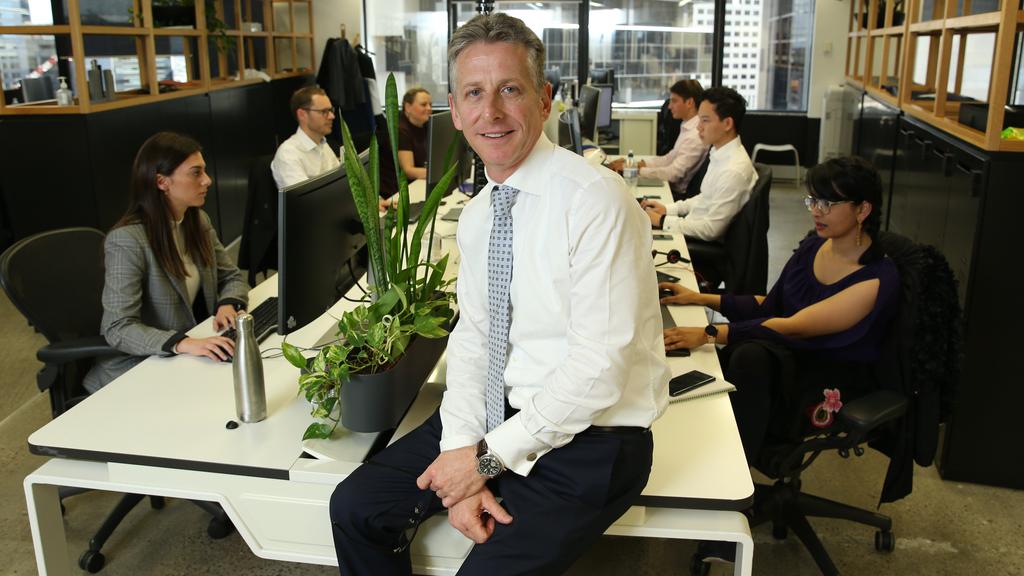Dexus funds play takes off but rivals jockey for place at real assets feast

CEO Darren Steinberg: ‘This transaction positions Dexus as a leading real asset manager.’ Picture: Britta Campion
Property group Dexus is bedding down one of the largest property and infrastructure deals of this cycle, after acquiring the local part of the once legendary AMP Capital funds operation.
For Dexus, getting control of about $28bn worth of local assets in the renamed Collimate Capital business could be quite simply transformative, if it can retain and then expand upon the empire.
An initial outlay of $250m plus about $450m for co-investment stakes could rise to about $1bn if it succeeds in holding on to all the funds.
Dexus will control of some of the country’s best office towers and shopping centres and become a serious player in infrastructure funds management. It would add about $18.9bn worth of property assets and about $9.8bn of infrastructure assets if it can hold all the funds.
For the Darren Steinberg-led group it’s part of diversifying from its traditional office holdings and into new areas, particularly expanding into funds management where it already has a $27bn empire.
There is also the potential synergies that come out of the shift into infrastructure, a growing field where there is increasing crossover with large investors in property deal-making in areas like airports.
“This transaction positions Dexus as a leading real asset manager, with new capabilities and an expanded product offering, underpinned by our best practice governance and risk management framework,” Mr Steinberg said.
But it won’t come easy for Dexus as keeping the funds platform together will hold its own challenges.

For Dexus, getting control of about $28bn worth of local assets in the renamed Collimate Capital business could be quite simply transformative. Picture: NCA NewsWire / Steven Saphore
The key flashpoint will be the AMP Capital Wholesale Office Fund with investors still to decide the ultimate fate of the fund after last week making its future management contingent on a 50 per cent vote.
Investors in the near $8bn vehicle will now decide whether they will shift to the Dexus platform or opt for a switch to Mirvac, which has worked on taking on the vehicle for months and has claimed hefty support.
Mirvac claims to be well-positioned with investor support including negotiated documentation. An independent committee, aided by investment bank Jarden, is weighing advice to the fund trustee.
The key issues are less about Dexus’s capability than how it manages conflicts of running new funds with its own balance sheet, the Dexus Wholesale Property Fund, and mandates it holds.
Dexus believes that it is up to the task and will succeed partly on the basis that it will be able to provide the best home for former AMP Capital staff who have gone through the travails of AMP’s corporate woes and earlier failed deals.
Sources said that investors had seen value in having Collimate’s management staying on with the extra resources that Dexus brings.
Mirvac is close to gaining due diligence and is likely to seek to structure a transaction to ensure there are no risks to wholesale investors if the manager changes.
The sale of the Collimate operation could trigger pre-emptive rights on assets in the office fund, including Sydney’s Quay Quarter Tower, and the incoming managers will need to work on a plan to keep it together.
“It’s unit holders who will decide the outcome, not AMP or Dexus,” one senior player said.
But Mirvac is certainly not going away. It has claimed the support of a majority of investors in the office fund for it to get at the very least due diligence to put its proposal.
The company is not playing the role of destabiliser, rather arguing that investors are more than capable of looking after their own interests.
Superannuation giant UniSuper has already shown this by decamping with about $2.8bn worth of primarily retail funds going to GPT.
Dexus is also seeking to lock down infrastructure investors as big managers including Plenary weigh up wooing them away.
UBS analysts Tom Bodor and Grant McCasker see near-term risks with Dexus almost doubling its staff count and significant focus required to maintain the funds in the ex-AMP platform, although a price adjustment mechanism provides a buffer.
“The move takes Dexus into their desired infrastructure adjacency and further into real estate funds management, including retail funds distribution,” they said.
“However, we see risks, with the potential for fund mandates to transition elsewhere and significant cost out required to lift margins to Dexus’s 38 per cent level, which is required to justify the price,” they said.
Barrenjoey’s Ben Brayshaw said Dexus was likely to have squeezed out Mirvac and GPT as potential contenders to manage the office fund. “Strategically, the acquisition accelerates Dexus’s transition from an asset heavy office and logistics landlord, to a capital light fund manager,” he said.
But for now the funds are in flux.







